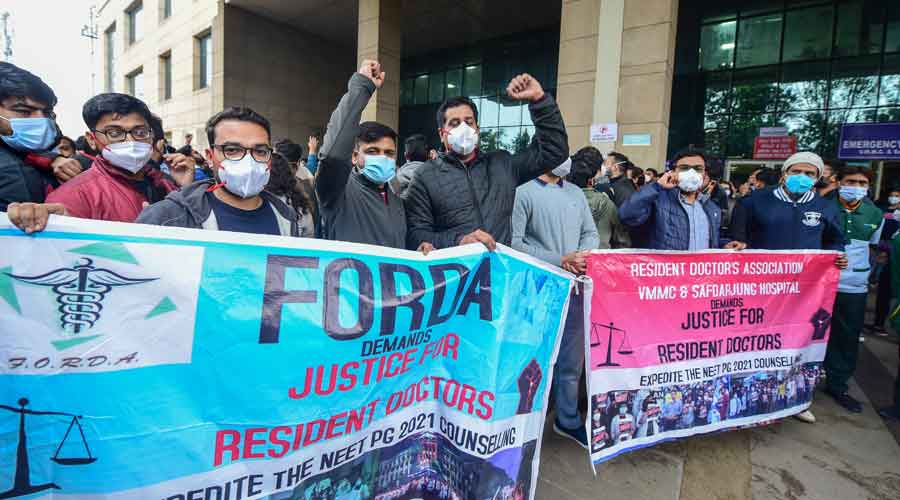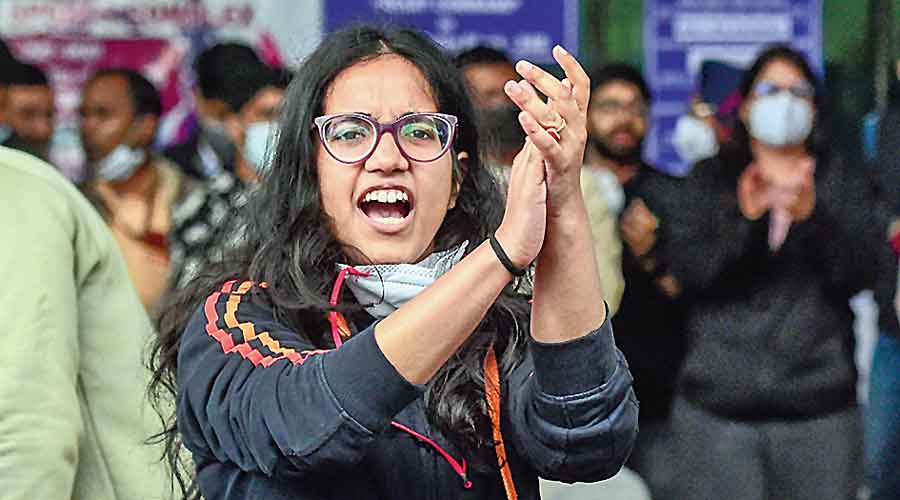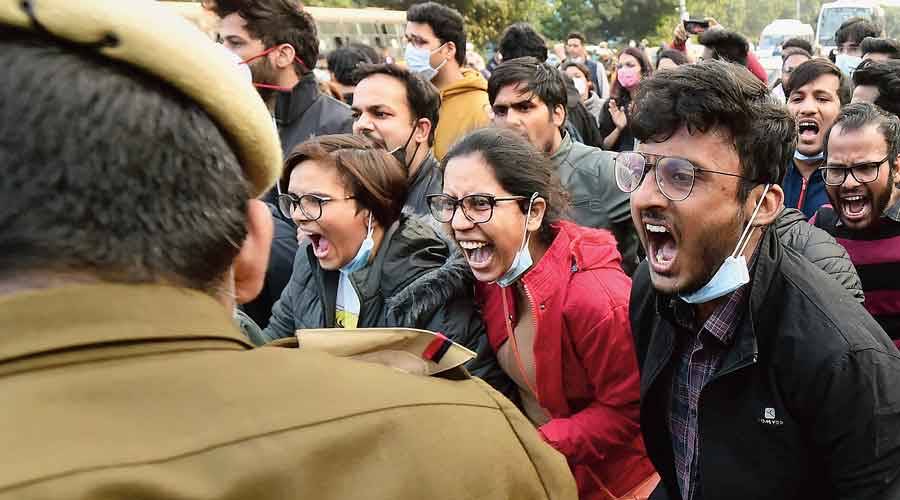Tens of thousands of resident doctors in medical colleges across India are expected to stay away from delivering healthcare services on Wednesday to intensify their protests against delays in admissions to postgraduate medical courses in 2021.
The nationwide entrance test due in January 2021 was held in September. But the counselling — to decide who gets which course where — and admissions stalled after a Union health ministry proposal to reserve seats for economically weaker sections (EWS) was challenged in the Supreme Court.
The delay has meant that around 80,000 second-year and third-year resident doctors — the backbone of healthcare services in academic institutions — have since July been managing patients who would be assigned to 120,000 doctors, resident doctors’ representatives said.
While around 40,000 MBBS doctors who have qualified the entrance exam are waiting to join the PG courses as first-year residents, the second-year and third-year residents are trying to juggle their clinical workload with studies and preparations for final exams.
“It is frustrating — not because of the extra work itself, but because it eats into learning opportunities, and I’m way behind on studies,” a resident doctor in a pulmonary medicine department in Mumbai, who was on duty for 42 straight hours this week, told The Telegraph. The doctor slept for about four hours before reporting back for duty.
Resident doctors have been protesting since November 27 and the Federation of the All India Medical Association (FAIMA), a representative body, on Monday announced a nationwide strike on Wednesday after resident doctors from several medical colleges were allegedly roughed up by Delhi police. Delhi police have denied the charge.
“The scary thing is that if admissions get delayed beyond March or April, another batch will leave and we’ll have 40,000 residents assigned tasks for 120,000,” said Rohan Krishnan, FAIMA president and a senior resident and orthopaedic surgeon in a Delhi medical college.
Many believe the extra workload could silently impair quality of patient care. “It is well known that errors in medical practice are more likely to occur when doctors are overburdened and overworked,” said Suvrankar Datta, the general secretary of FAIMA.
The pulmonary medicine resident in Mumbai said the extra workload with patients that would typically have been assigned to first-year residents had meant PG students had missed many bedside sessions with senior faculty.
“A large amount of PG education is through bedside learning from faculty,” the doctor said. “Today, I had to accompany a patient for a CT scan and wasn’t able to join the faculty for our ward rounds.”
Krishnan and others say they are baffled by the reason for the delay — a four-week period sought by the health ministry to explain why it set Rs 8 lakh as the annual income cut-off for the EWS quota.

Doctors shout slogans at the Safdarjung Hospital in New Delhi on Tuesday. PTI Photo
“It is ridiculous, we would expect the government to be able to explain why it chose that cut-off on the very same day that it had announced it,” Krishnan said. “We don’t understand why it needs time to explain how it arrived at that number.”
FAIMA and other resident doctors’ representatives met health ministry officials on Tuesday evening.
After the meeting with the residents’ representatives, Union health minister Mansukh Mandaviya said the government was unable to start counselling because the matter was sub judice. “The next hearing will take place on January 6, I hope counselling will start soon,” Mandaviya said, urging the doctors not to go on strike.
FAIMA executives appeared dissatisfied with the meeting’s outcome. “Does the government really want the impasse to end? Or was this just another PR stunt?” Datta tweeted. “The meeting was nothing less than mockery and disrespect to the medical fraternity.”
“The call for the strike remains — we’re expecting resident doctors’ associations from government medical colleges in many states to withdraw from work on Wednesday,” Datta said.
‘Beaten up’
The protesting doctors alleged that several of them were manhandled and beaten up by Delhi police on Monday when they were trying to march towards the Supreme Court.
Suman Goyal, additional commissioner, said the police had the highest regard for doctors and there was no lathicharge on them. “Some policemen were injured while stopping the doctors from breaking the barricades near the ITO crossing when they were trying to march to the Supreme Court,” the officer said.
“I would like to clarify that no force was used. Delhi police have the highest regard for doctors. A few policemen were injured and some police vehicles were also damaged,” Goyal said.
Left in limbo: Doctor recounts
The following is an account by a doctor who has secured a high rank in the PG entrance exam. The doctor preferred not to be named, fearing reprisal.
Preparing for NEET-PG (the entrance exam for postgraduate medical courses nationwide) isn’t a joke and by no means easy. But, to fulfil one’s dreams of being a specialist, the hole in the needle must be threaded and to that end, an arduous journey must be undertaken with no end in sight. Finally, after months of Covid-related uncertainty, the date of the exam was fixed for September 11, 2021.
I managed to secure a good rank. I should be able to secure a college and a specialisation of my choosing. While we were awaiting the counselling process, the government tied itself in knots trying to explain the EWS (economically weaker sections) reservation. Since October 25, when the counselling was originally scheduled, the entire process is stuck as the government itself is not clear why it chose Rs 8 lakh per annum as the cut-off for the EWS benefit.
The Supreme Court has stayed the counselling process, leaving hundreds of doctors like me in limbo. Being unable to begin the most important part of our medical education — specialist training — is just adding more salt to the wound.
We can’t even join hospitals in the interim to work as MBBS doctors as most hospitals require a commitment of a minimum three months of work.
We are not in a position to make any commitments as we can’t say when the court will give its verdict. If that happens within three months, we’ll end up paying huge penalties to the hospitals for breaking the commitment.
With the next wave of Covid-19 perceived to be round the corner, government hospitals are short of around 40,000 doctors. The government also seems to be in no mood to parley with current resident doctors — or postgraduate students — to sort the issue out, as is evident by the disgusting and inhumane manhandling of protesting doctors, my seniors, in New Delhi and elsewhere.
During the first wave of Covid-19, the government didn’t have enough beds to fight the virus. In the next, it didn’t have enough oxygen. By the looks of it, for the third wave, the government won’t have enough doctors.
Additional reporting by Imran Ahmed Siddiqui












